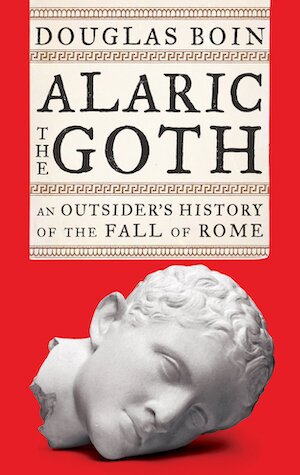Douglas Boin
Author of
Clodia of Rome (Norton, 2025)
Alaric the Goth: An Outsider's History of the Fall of Rome, (Norton, 2021)
Coming Out Christian in the Roman World, (Bloomsbury Press, 2020)
Douglas Boin Ph.D is an expert on the religious history of the Roman Empire, particularly as it pertains to the “pagan,” Christian and Jewish world of the ancient Mediterranean. His first book, Ostia in Late Antiquity (Cambridge University Press, 2013) examined the rhythms of daily life and religious change that characterized life in the old harbor town of Rome at the “end of the empire,” a period that witnessed the rise of the more visible Christianity. Ostia in Late Antiquity was the product of ten years of research on-site, during which he also helped an international team of archaeologist and historians study the remains of the city’s ancient synagogue and Jewish community.
A native of Chicago, he received a B.A. from Georgetown University and an M.A. and Ph.D. from the University of Texas at Austin. He is an Assistant Professor of Ancient and Late Antique Mediterranean History at Saint Louis University and has worked extensively as an archaeologist in Rome. From 2010-2013, he taught in the Department of Classics at Georgetown University. His scholarship has appeared in The Journal of Roman Studies, The American Journal of Archaeology, and The Papers of the British School at Rome, and he has authored entries on “synagogues” and “church buildings” for the multi-volume reference work, The Oxford Encyclopedia of Ancient Greece and Rome. He speaks regularly on aspects of Roman history, archaeology, and religion at national and international conference.
Website / Instagram / Facebook / Represented by Ayesha Pande
Books by Douglas
Clodia of Rome (Norton, 2025)
A thrilling new history of the late Roman Republic, told through one woman’s quest for justice.
One of Rome’s most powerful women, Clodia has been maligned over two thousand years as a promiscuous, husband-murdering harlot – thanks to her starring role in one of Cicero’s most famous speeches in the Forum. But Cicero was lying, in defense of his own property and interests. Like so many women libeled or erased from history, Clodia had a life that was much more interesting, complex and nuanced than the corrupted version passed down through generations.
Drawing on neglected sources and deep, empathetic study of Roman lives, classicist Douglas Boin reconstructs Clodia’s eventful passage through her politically divided and tumultuous times from her privileged childhood to her picking up a family baton of egalitarian activism. A widow and single mother, Clodia had a charisma and power that rivaled her male contemporaries and struck fear into the heart of Rome’s political elite. That is, until a sensational murder trial, rife with corruption and told here in riveting detail, brought about her fall from grace. For generations of women who came after her—including a young Cleopatra, who might have met a disgraced Clodia when she first came to Rome—Clodia’s story would loom as a cautionary tale about the hostilities women would face when they challenged the world of men.
Freed from the caricature that Cicero painted of her, Clodia serves as a reminder of countless women whose stories have been erased from the historical record. In a Rome whose citizens were engaged in heated debates on imperialism, immigration, and enfranchisement, amidst rising anxieties about women’s role in society, Clodia was an icon—one worth remembering today.
Praise:
“A brilliant, charismatic, politically savvy woman is ruined by misogyny and malice via a high-profile murder case—one over 2,000 years old. Douglas Boin’s spellbinding account of a Roman woman named Clodia, who died in 44 BC, shows his mastery of archaeological storytelling, excavating the complex layers of a long overdue exoneration of an extraordinary and timeless woman.” --Sarah Parcak, author of Archaeology from Space
“Douglas Boin valiantly recovers, reconstructs, and restores the reputation of a strong and independent woman who flouted social norms, attacked the prevailing system of inequality and injustice, and was punished by the powerful men she challenged. Clodia of Rome is a breath of fresh air blowing through the history of the Roman world.” --Mike Duncan, author of Hero of Two Worlds and The Storm Before the Storm
Alaric the Goth: An Outsider's History of the Fall of Rome, (Norton, 2021)
Denied citizenship by the Roman Empire, a soldier named Alaric changed history by unleashing a surprise attack on the capital city of an unjust empire.
Stigmatized and relegated to the margins of Roman society, the Goths were violent “barbarians” who destroyed “civilization,” at least in the conventional story of Rome’s collapse. But a slight shift of perspective brings their history, and ours, shockingly alive.
Alaric grew up near the river border that separated Gothic territory from Roman. He survived a border policy that separated migrant children from their parents, and he was denied benefits he likely expected from military service. Romans were deeply conflicted over who should enjoy the privileges of citizenship. They wanted to buttress their global power, but were insecure about Roman identity; they depended on foreign goods, but scoffed at and denied foreigners their own voices and humanity. In stark contrast to the rising bigotry, intolerance, and zealotry among Romans during Alaric’s lifetime, the Goths, as practicing Christians, valued religious pluralism and tolerance. The marginalized Goths, marked by history as frightening harbingers of destruction and of the Dark Ages, preserved virtues of the ancient world that we take for granted.
The three nights of riots Alaric and the Goths brought to the capital struck fear into the hearts of the powerful, but the riots were not without cause. Combining vivid storytelling and historical analysis, Douglas Boin reveals the Goths’ complex and fascinating legacy in shaping our world.
Coming Out Christian in the Roman World, (Bloomsbury Press, 2020)
Coming Out Christian in the Roman World, forthcoming from Bloomsbury Press, will bring his perspective on how Christians “triumphed” in ancient Rome to a wider audience. It will draw attention to the range of social strategies by which the movement gained acceptance in Rome, as well as treat the fractious social wrangling (“How much should Christians accommodate to the culture of their day?”) which has been an inner feature of the movement from its start.








